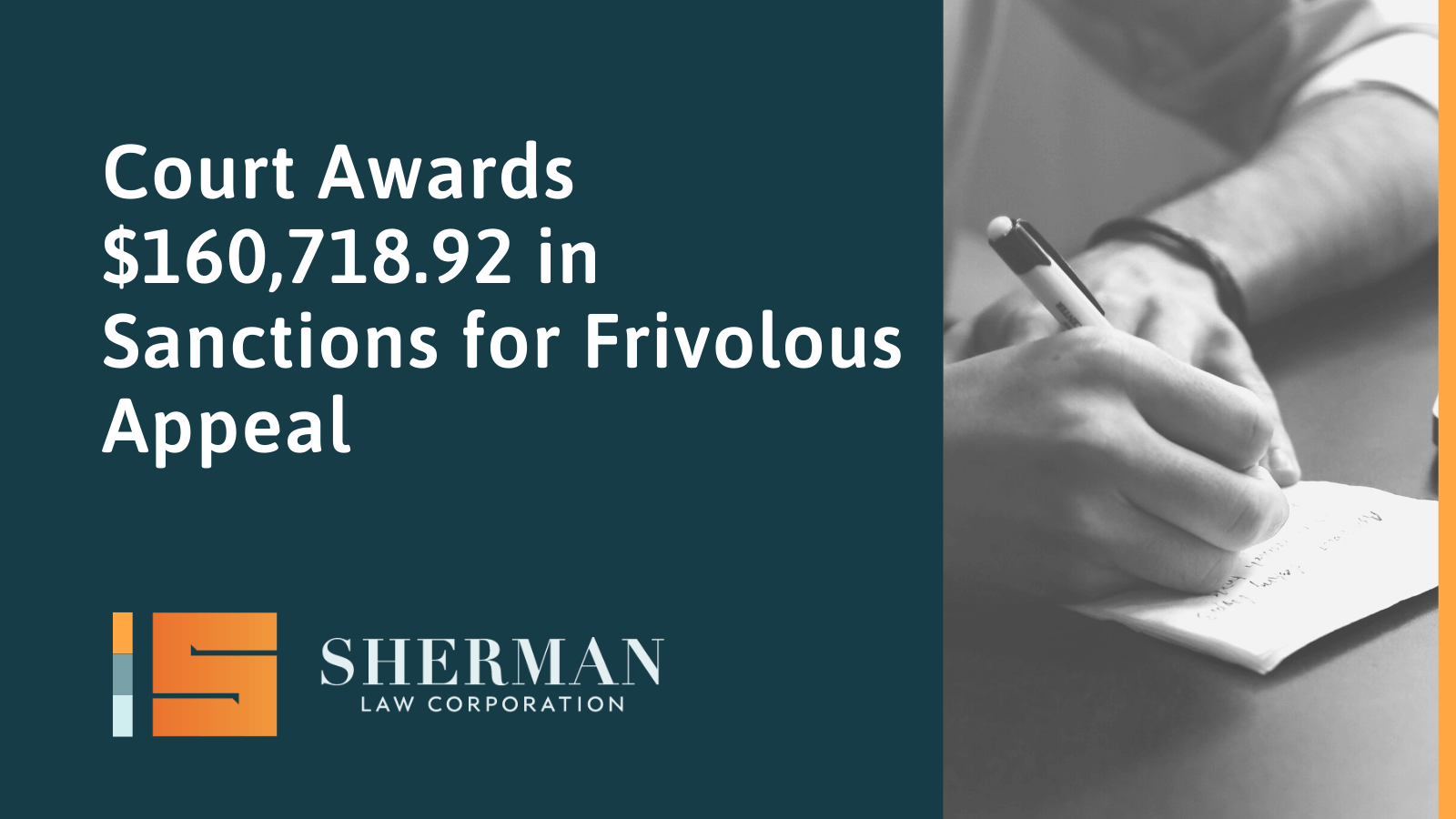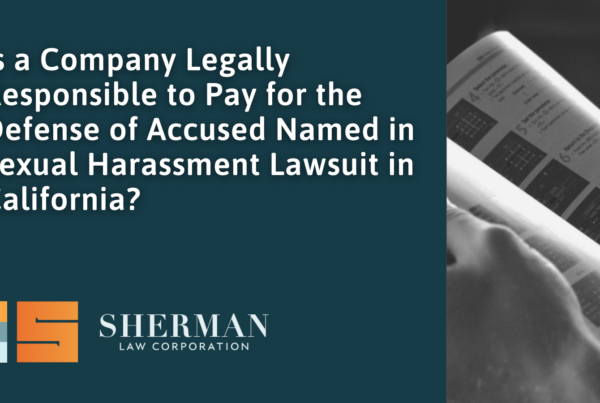
Summary of the Facts, Allegations & Trial Court Proceedings:
This case is no ordinary partnership dissolution matter between two experienced employment law litigators. Before Plaintiff/Appellant attorney (“Plaintiff/Appellant”) sued Defendant/Respondent (“Defendant/Respondent”) attorney, Plaintiff/Appellant froze over $750,000 of attorneys’ fees indisputably earned by Defendant/Respondent during their partnership in their shared bank account. Plaintiff/ Appellant’s lawsuit not only claimed that she was entitled to all of Defendant/Respondent’s attorneys’ fees earned pre-dissolution, but also, post-dissolution.
At Plaintiff/Appellant’s first — and only day — of deposition, Plaintiff/Appellant admitted to feloniously spying on Defendant/Respondent’s private emails without her consent, irrefutably violating the Comprehensive Computer Data Access and Fraud Act, California Penal Code § 502. Plaintiff/Appellant refused to sit for any additional days of her deposition, claiming that she was ill. Despite Plaintiff/Appellant’s repeated representations to the trial court that she had evidence of her “illness,” when the trial court ordered Plaintiff/Appellant to provide proof, she repeatedly refused. When her medical records were finally revealed, they exposed the real reason Plaintiff/Appellant fought so hard to keep Defendant/Respondent from seeing them:
The medical records unequivocally proved that Plaintiff/Appellant was medically released to work throughout July 2014. Plaintiff/Appellant had no medical excuse for violating the trial court’s orders; her representations were knowingly false when made.
The trial court granted Defendant/Respondent’s motion for terminating and monetary sanctions against Plaintiff/Appellant finding “a pattern and practice of delay, as well as, willful disobedience to this court’s order given the utter and repeated failure to present admissible evidence showing that [Plaintiff/Appellant] suffers from a serious medical condition that prevents her from sitting for deposition.” The Court imposed $30,000 in monetary sanctions explaining:
“When I just look at the amount of work that has been done since the first effort to get one deposition, it is unbelievable what she has done to thwart the defendant’s efforts to get a simple deposition and the court’s order which she did not obey. The record is so complete with recalcitrance. I don’t know what else to call it, except for her deviousness. I don’t really have any options here. I played it out. I’ve gone through the Code. What could I do? How could I do it? I don’t have any options here that are left to me. She’s basically closed that door herself. She created this problem. It’s hers.”
The trial court dismissed Plaintiff/Appellant’s complaint (lawsuit); struck Plaintiff/Appellant’s answer to Defendant/Respondent’s cross-complaint. On December 5, 2014, the trial court entered a default judgment in favor of Defendant/Respondent on her cross-complaint for recovery of previously earned pre-dissolution attorneys’ fees withheld in the amount of $521,978.79, plus interest and awarded $30,000 in attorneys’ fees as a sanction and $15,000 in additional attorneys’ fees, plus interest.
Plaintiff/Appellant Omitted Harmful Evidence & Materially Misrepresented the Trial Court Record, Continued to Delay, Cut-off Defendant/Respondent from Seeking Sanctions Against Plaintiff/Appellant by her 11th Hour Dismissal of her Appeal.
Plaintiff/Appellant immediately appealed on her own, eventually retaining new counsel. She contended that the trial court abused its discretion by imposing “capital punishment” – terminating sanctions on a record devoid of supporting evidence. The record, however, directly contradicted her representations to the California Court of Appeals. Recognizing this, Plaintiff/Appellant
- systematically and strategically excluded the unfavorable portions of the trial record from the appellate record.
- included some of the harmful documents but deleted key portions of those harmful documents – including 216 pages of the evidence Defendant/Respondent filed in support of her motion for terminating sanctions.
- asserted material misrepresentations in her appendix refuted by the actual trial court record;
- after counsel for Defendant/Respondent informed counsel for Plaintiff/Appellant that he intended to file a motion for sanctions following receipt of Plaintiff/Appellant’s reply brief, Plaintiff/Appellant, by and through counsel, obtained two extensions of time in which to file her reply brief, only to file a request to dismiss the appeal instead which in effect cut-off Defendant/Respondent from filing her intended motion for sanctions against her as the dismissal triggered The Court of Appeals to automatically remit the case back to the trial court.
Only When the Court of Appeals Advised the Parties that It was Considering Ordering Sanctions against Plaintiff/Appellant did she Immediately Accept a Prior Settlement Offer and Wire to Defendant/Respondent’s Counsel Over $600,000 Cash.
On August 3, the Court of Appeals advised the parties that they were considering ordering sanctions against Plaintiff/Appellant and ordered the parties to appear for oral argument on August 30, 2016. Prior to the Court’s August 3 Order, Defendant/Respondent previously sent a written settlement proposal, which was ignored by Plaintiff/Appellant until receipt of the Court’s August 3 Order. Within hours after receiving the Court’s Order, before Defendant/Respondant had the opportunity to revoke the prior offer, Plaintiff/Appellant accepted it and wired over $600,000 cash to counsel for Defendant/Respondent’s trust account. Defendant/Respondent disputed that there was a settlement, only distributing the principal and interest on the judgment to Defendant/Respondent, retaining the remainder in the firm’s trust account.
The California Court of Appeals Granted Defendant/Respondent’s Request for $160,718.92 in Sanctions against Plaintiff/Appellant and her Counsel for Filing and Pursing a Frivolous Appeal.
The California Court of Appeals concluded that sanctions against Plaintiff/Appellant and her Counsel were warranted finding by clear and convincing evidence that Plaintiff/Appellant pursued the appeal solely to delay, noting that the last-minute dismissal was “the kind of ‘recalcitrance’ that justified the trial court’s termination sanction in the first place.” Representations by Plaintiff/Appellant that she had medical documentation to medically excuse her attendance at deposition in July 2014 were false such that her appeal was totally without merit. Moreover, Plaintiff/Appellant’s submission of an incomplete appellate record omitting hundreds of pages of critical evidence supporting the trial court’s orders at issue further evidenced her intention to delay, gamesmanship, and frivolousness of the appeal. Moreover, the Court rejected her attorney’s excuse for not submitting a complete record — that the files he received were disorganized when he obtained them from his client. In ordering joint and several liability against her counsel, the Court of Appeals concluded that her counsel should have ordered a clerk’s transcript or worked with opposing counsel to ensure that the appendix and underlying record were complete.
As for the amount awarded, the Court recognized that Defendant/Respondent’s request was substantial, however, the panel of judges concluded that the entire amount was fully warranted in this case, based on the substantial amount of the underlying six-figure judgment coupled with the numerous delays, all of which put a three-fold strain on Defendant/Respondent, a solo practitioner. First, she was deprived of the substantial judgment she was entitled to recover two years earlier. Second, she was forced her to pay an attorney through the two-year appeal. Third, she was forced to forego other work to personally work on the appeal to keep costs down on retained counsel, not to mention paying other counsel to cover her ongoing cases. Lastly, the Court found that Plaintiff/Appellant’s recalcitrance in the trial court and on appeal necessitated a severe sanction to discourage similar conduct in the future.
The Significance of the Court’s Ruling
Unfortunately, the Court of Appeals denied Defendant/Respondent’s request to publish this decision, which means that the opinion does not have precedential value in future cases. However, the mere fact a decision is unpublished does not necessarily mean that it cannot be cited at all in any and all courts. Depending on the venue and circumstances, unpublished opinions may be a useful source of persuasive authority. The local civil rules in federal district courts, for example, have the power to prohibit or restrict citation to unpublished opinions by local court rule, such that it is important that the rules are carefully followed before relying on them.
Nonetheless, the Court of Appeals’ opinion is significant to California practitioners because it provides valuable insight on how this panel of judges is likely to rule on similar factual cases. In researching prior cases in which attorneys’ fees were awarded as sanctions by the California Courts of Appeals for frivolous appeals, none of the amounts awarded were even remotely close to the six-figure sanctions award ordered against Plaintiff/Appellant, and her counsel of record in this case.
Lisa Sherman aided Defendant/Respondent in the appeal and on her other ongoing litigation cases during the pendency of the appeal.
For more information on frivolous appeals, feel free to call Lisa Sherman at (323) 488-2087 or email lisa@sherm-law.com.
| Related Links: |




